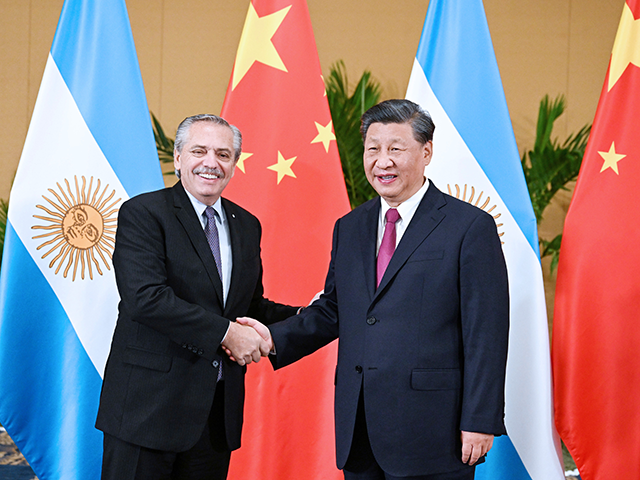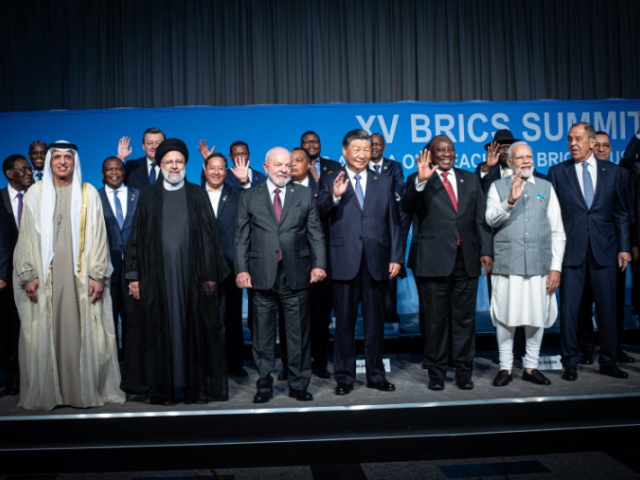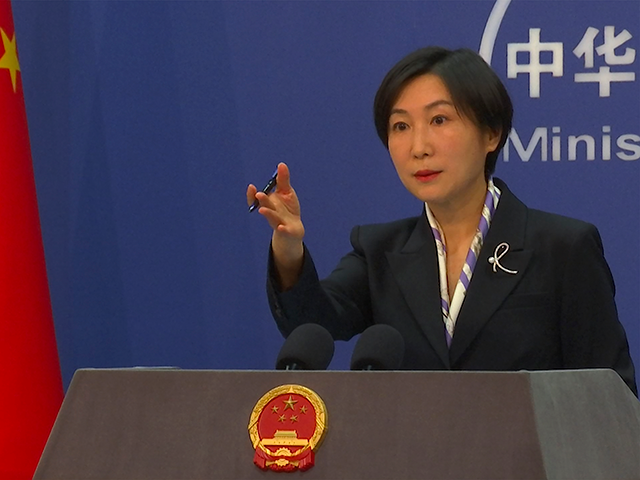The Chinese Communist Party, which has invested heavily in exerting influence over Argentina, issued a cold statement of congratulations on Monday to President-elect Javier Milei, hoping to continue its “friendship” with the South American nation.
Milei is a self-described libertarian and staunch anti-communist. The outsider candidate won a decisive victory in Sunday’s runoff presidential election, with a lead of more than 11 percentage points, against socialist current Economy Minister Sergio Massa.
“China congratulates Argentina on a smooth presidential election and congratulates Mr. Javier Milei on his election as the President of Argentina,” Chinese Foreign Ministry spokesperson Mao Ning said at a Monday press conference.
“China values its relations with Argentina from a strategic and long-term point of view and stands ready to work with Argentina to continue nurturing our friendship,” Mao continued, “contribute to each other’s development and prosperity through win-win cooperation, and keep our relations on a steady and sustained track of growth for the benefit of the two peoples”:
Milei, a libertarian economist, became the candidate to win Argentina’s presidency by the most votes ever on Sunday with a promise to fix the nation’s severe economic distress and out-of-control inflation.
Under the pro-China presidency of socialist incumbent Alberto Fernández, Argentina adopted closer ties to Beijing and joined China’s predatory Belt and Road Initiative (BRI) debt trap in February 2022. The Communist Party exploited the ongoing dire economic and social situation to exert pressure on Argentina, taking control of some of the nation’s key strategic sectors.

Chinese President Xi Jinping meets with Argentine President Alberto Fernandez in Bali, Indonesia, on Nov. 15, 2022 (Photo by Rao Aimin/Xinhua via Getty Images).
Fernández also made great efforts to have Argentina steer away from the U.S. dollar and replace it with the Chinese yuan after essentially depleting all of the nation’s foreign reserves, choosing to adopt the yuan to conduct its trade with China as of April. Argentina has now used Chinese funds to pay its over $40 billion debt to the International Monetary Fund (IMF) using the yuan after the organization announced in July that it was fine to do so.
Argentina was granted a spot this year in the China-led BRICS (Brazil, Russia, India, China, South Africa) trade and security bloc as one of six new members, whose membership will take effect starting on January 1, 2024.
Milei’s unprecedented victory poses a threat to China’s plans for Argentina, with all signs pointing to Argentina declining its upcoming BRICS membership before the January deadline. Milei, who takes office on December 10, has repeatedly stated that, as president, he would cut Argentina’s ties with China because he “doesn’t do business with communists.”

BRICS is made up of Brazil, Russia, India, China, and South Africa. New Members are Argentina, Egypt, Ethiopia, Iran, the U.A.E., and Saudi Arabia (Per-Anders Pettersson/Getty Images).
“Not only would I not do business with China; I won’t do business with any communist,” Milei told Tucker Carlson in an exclusive interview in September. “I am a defender of freedom, peace, and democracy. Communists have no place there. The Chinese have no place there. [Russian strongman Vladimir] Putin has no place there. Let’s go further: [socialist Brazilian President] Lula [da Silva] has no place there.”
In October, Milei stated during an interview given to the Argentine América 24 news channel that if he was elected, Argentina would align itself with the United States and Israel, rather than China and BRICS.
“What I said is the following: I will not make strategic alliances in geopolitical terms with people who do not respect freedom, with people who do not respect peace. I will not make deals with communists,” Milei said at the time. “Now, that is a geopolitical definition.”
“Tomorrow, if you [as a private company] want to do trade with China, do it, it is not my problem. Do it,” he continued. “But I as a country will not align myself with communists, or with those who do not defend freedom, or with those who do not defend democracy, or who are not peaceful.”
During an interview given in September, Diana Mondino, an Argentine economist recently confirmed by Milei to be the nation’s next foreign minister, rejected the prospect of Argentina’s inclusion in BRICS, describing the situation as being “invited to a party where your ex is going to be.”
“At stake in the BRICS is whether or not to expand the United Nations Security Council and who would be the participants,” Mondino said at the time. “At stake is the security of the South Atlantic and the domain of information, from what information they access to the communications we may have within the country.”
Mondino previously condemned Argentina’s adhesion to BRICS as having “no objective benefit” to the South American country.
“If the decision is to align Argentina with these countries when we are already in elections,” she said, “it is one more sign of improvisation and pure political objective, without any objective benefit for our country.”
Argentina’s foreign-minister-to-be reportedly told the Russian state-owned RIA Novosti news agency, “We don’t understand what the benefit [of joining BRICS] is for Argentina at the moment. If it later turns out that there is a benefit, we will analyze it.”
When asked for comment regarding Mondino’s statements given to RIA Novosti, Spokesperson Mao Ning said she was “not aware” of such comments.

Chinese Foreign Ministry spokesperson Mao Ning gestures during a press conference at the Ministry of Foreign Affairs in Beijing on Wednesday, March 1, 2023 (AP Photo/Liu Zheng).
“BRICS is an important platform for stronger solidarity and cooperation among emerging markets and developing countries to uphold common interest,” Ming answered. “It is an open platform. We welcome all countries that are interested to become a member of the BRICS family.”
Christian K. Caruzo is a Venezuelan writer and documents life under socialism. You can follow him on Twitter here.


COMMENTS
Please let us know if you're having issues with commenting.